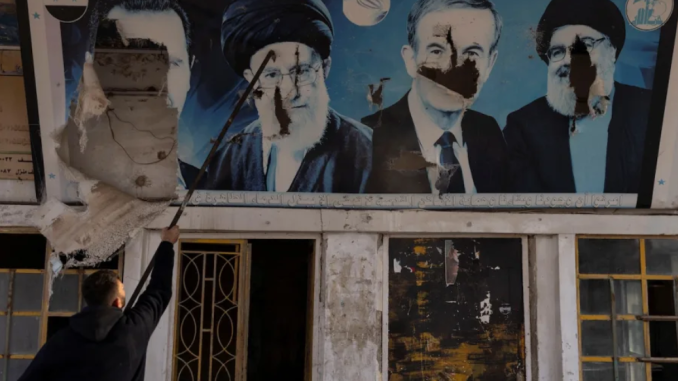Assad prevented Syria-based proxies from opening war front against Israel, general says
 A worker tears down the pictures of Syria’s Bashar al-Assad, former Syrian President Hafez al-Assad, Lebanon’s late Hezbollah leader Sayyed Hassan Nasrallah and Iran’s Supreme Leader Ayatollah Ali Khamenei at a gas station in Nubl, a Shi’ite village seized by rebels, in rural Aleppo, Syria, December 11, 2024. REUTERS/Umit Bektas
A worker tears down the pictures of Syria’s Bashar al-Assad, former Syrian President Hafez al-Assad, Lebanon’s late Hezbollah leader Sayyed Hassan Nasrallah and Iran’s Supreme Leader Ayatollah Ali Khamenei at a gas station in Nubl, a Shi’ite village seized by rebels, in rural Aleppo, Syria, December 11, 2024. REUTERS/Umit Bektas
Following the collapse of the Assad regime in Syria and the subsequent expulsion of the large Iranian presence, the Ayatollah regime has publicly sought to downplay the loss, but internally, power factions quickly turned on each other to assign blame.
This week, a leaked recording from a general’s speech revealed that the regime has acknowledged it was “defeated very badly” in Syria. The audio footage came from Brig.-Gen. Behrouz Esbati, who spoke at a mosque in Tehran last week.
“I don’t consider losing Syria something to be proud of,” Brig.-Gen. Esbati said in the leak first published by Abdi Media, a Geneva-based Iranian news site. “We were defeated, and defeated very badly, we took a very big blow and it’s been very difficult.”
Esbati also noted that relations with Bashar al-Assad had worsened in the months before his expulsion, as Syria refused to allow Iran’s proxy militias to open a full war front against Israel on the Golan Heights, despite being presented with detailed military plans.
In addition, he accused Russia of misleading Iran and betraying the Assad regime, by dropping bombs on open fields while claiming to bomb the advancing rebels. He also said that Russia had colluded with Israel by turning off its air defense radars to allow Israeli jets to strike Iranian targets in Syria.
However the still unstable situation in Syria will play out, Esbati said, the Iranian regime would try to recruit new forces in the country. “We can activate all the networks we have worked with over the years,” he said.
“We can activate the social layers that our guys lived among for years; we can be active in social media and we can form resistance cells. Now we can operate there as we do in other international arenas, and we have already started.”
In its public statements, regime officials so far indicated they would tacitly accept the new Syrian government. However, Esbati’s comments confirmed several recent statements made by Supreme Leader Ali Khamenei, who claimed that Syria’s youth would rise against the new government, possibly with Iranian help.
“Do not be deceived by this false show,” Khamenei said last week at a ceremony to mark the fifth anniversary of the death of former IRGC Quds Force commander Qassem Soleimani, in apparent reference to Syria’s new de-facto leader Ahmad al-Shara’a (al-Jolani).
“Those who are strutting around today will one day be trampled under the feet of the faithful. Those who have encroached on the land of the Syrian people will one day be forced to retreat in the face of the power of Syria’s youth,” Khamenei said.
Tehran supported the Assad regime with weapons, money, and thousands of Shia troops throughout the civil war, with its propaganda arm consistently denouncing the mainly Sunni rebel groups as “terrorists” and fueling sectarian hatred against them.
“Some people, due to a lack of proper analysis and understanding, claim that with the recent events in the region, the blood shed in defense of the shrine was wasted,” Khamenei said. “They are making this grave mistake; the blood was not wasted.”
The mention of a “shrine” refers to the regime’s justification for its military interventions in Iraq and Syria, which is the defense of the Shia holy places against Sunni Jihadists, who have often tried to destroy Shia shrines.
The most important Shia site in Syria is the Shrine of Sayyida Zainab near Damascus. Zainab was the granddaughter of the Prophet Muhammad and daughter of Ali, the most significant figure for Shia Muslims next to Muhammad.
Brig.-Gen. Esbati is a high-ranking commander in the Iranian Armed Forces, which include the regular military as well as the Revolutionary Guards (IRGC). According to the New York Times, he was in charge of Iran’s military operations in Syria until the Assad regime’s collapse and was in close contacts with Syrian officials and Russian commanders in the country.
His speech was held on Dec. 31, and was titled, “Answering questions about Syria’s collapse.”
In a question-and-answer portion, Esbati noted that Iran already retaliated for the death of Nasrallah with a missile barrage, adding that a third round of direct missile assaults on Israel was not on the table at the moment.
Esbati said “the situation” couldn’t realistically handle another such assault on Israel at this time.



Leave a Reply
You must be logged in to post a comment.